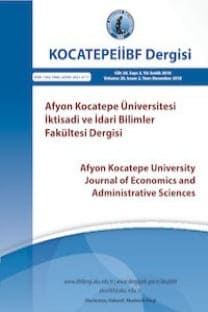ÇOK ULUSLU ŞİRKETLERİN TÜRKİYE’DEKİ PAZARA GİRİŞ ŞEKLİ SEÇİMİNİ BELİRLEYEN KURUMSAL UNSURLAR
Yeni bir pazara girme şekline karar verirken çok uluslu şirketleri etkileyen bir çok
faktör bulunmaktadır. Bu çalışmada kurumsal ekonomi bağlamında, çok uluslu şirketlerin
pazara giriş şeklini belirleyen faktörler araştırılmaktadır. Bu çalışmada iki farklı kurumsal
ekonomi teorisi, Kurumsal Teori ve Yeni Kurumsal Ekonomi değerlendirilmiştir. Türkiye’de
gerçekleşen 2293 adet pazara giriş incelenerek kurumsal ekonomi çerçevesinde, yatırım
özgürlüğü, fikri mülkiyet haklarının korunması ve yozlaşmanın çok uluslu şirketlerin pazara
giriş şekli seçimi üzerinde anlamlı etkisi olduğu bulunmuştur. Ayrıca reel gayri safi yurtiçi
hasıla, reel sermaye yatırımı, ve sektörel bilgi yoğunluğunun çok uluslu şirketlerin pazara giriş
şekli kararını şekillendiren diğer faktörler olduğu tespit edilmiştir.
Anahtar Kelimeler:
Çok uluslu şirketler, yabancı sermaye yatırımı, kurumsal faktörler, pazara giriş şekli
INSTITUTIONAL DETERMINANTS OF MULTINATIONAL CORPORATIONS' ENTRY MODE CHOICE IN TURKEY
There are a wide range of factors that affect multinational corporations (MNCs) when they decide how to enter into a new market. In this study, the factors that shape MNCs' entry mode decisions are investigated in institutional economics framework. Two different theories on institutions, namely Institutional Theory and New Institutional Economics, are utilized. Using 2293 entries into Turkey, we found that investment freedom, intellectual property rights protection and corruption have significant effects on the entry mode choice of MNCs in the institutional economics context. Besides, real GDP, real capital investment, and knowledge intensity of the sector are other factors that shape MNCs' entry mode decision.
___
- Bevan, Alan, Estrin, Saul and Meyer, Klaus, “Foreign investment location and institutional development in transition economies,” International Business Review, Vol. 13, (2004),
- pp. 43-64. Canabal, Anne and White III, George O., “Entry mode research: past and future,” International Business Review, Vol. 17, (2008), pp. 267-284.
- Chan, Christine M. and Makino, Shige, “Legitimacy and multi-level institutional environments: implications for foreign subsidiary ownership structure,” Journal of International Business Studies, Vol. 38, (2007), pp. 621-638.
- Cuervo-Cazurra, Alvaro, “Who cares about corruption?,” Journal of International Business Studies, Vol. 37, (2006), pp. 807-822.
- Delios, Andrew and Henisz, Witold J., “Japanese firms’ investment strategies in emerging markets,” Academy of Management Journal, Vol. 43, (2000), pp. 305-323.
- DiMaggio, Paul J. and Powell, Walter W., “The iron cage revisited: institutional isomorphism and collective rationality in organizational fields,” American Sociological Review, Vol. 48, (1983), pp.147-160.
- Dikova, Desislava and Van Witteloostuijn, Arjen, “Foreign direct investment mode choice: entry and establishment modes in transition economies,” Journal of International Business Studies, Vol. 38, (2007), pp. 1013-1033.
- Eden, Lorraine and Miller, Stewart, “Distance matters: Liability of foreignness, institutional distance and ownership strategy,” In M. A. Hitt, J.L.C. Cheng (Eds.) The evolving theory of the multinational firm. Advances in International Management, Vol. 16, (2004), pp. 187–221. Amsterdam, Netherlands: Elsevier.
- Grosse, Robert and Trevino, Len J., “New institutional economics and FDI location in Central and Eastern Europe,” Management International Review, Vol. 45, No. 2, (2005), pp. 123-145.
- Haunschild, Pamela R. and Miner, Anne S., “Modes of inter-organizational imitation: the effects of outcome salience and uncertainty,” Administrative Science Quarterly, Vol. 42, No. 3, (1997), pp. 472-500.
- Henisz, Witold J., “The institutional environment for economic growth,” Economics and Politics, Vol. 12, No.1, (2000), pp. 1-31.
- Henisz, Witold J. and Delios, Andrew, “Uncertainty, Imitation, and Plant Location: Japanese Multinational Corporations, 1990-1996,” Administrative Science Quarterly, Vol. 46, No. 3, (2001), pp. 443-475.
- Hennart, Jean F., “The transaction costs theory of joint ventures: An empirical study of Japanese subsidiaries in the United States,” Management Science, Vol. 17, No. 4, (1991), pp. 483-497.
- Hofstede, Geert, Culture’s consequences, New York, NY: Sage, 1980.
- Kogut, Bruce, “Designing global strategies: profiting from operational flexibility,” Sloan Management Review, Vol. 27, No.1, (1985), pp. 27-38.
- Kostova, Tatiana and Roth, Kendall, “Adoption of an organizational practice by subsidiaries of multinational corporations: institutional and relational effects,” Academy of Management Journal, Vol. 45, No. 1, (2002), pp. 215-233.
- Lee, Frank and Has, Handan, “A quantitative assessment of high-knowledge industries versus industries,” In P. Howitt (Ed.). The implications of knowledge-based growth for micro
- ISSN: 1302-1966
- Yayın Aralığı: Yılda 2 Sayı
- Başlangıç: 1999
- Yayıncı: Afyon Kocatepe Üniversitesi, İktisadi ve İdari Bilimler Fakültesi
Sayıdaki Diğer Makaleler
TÜRK TURİZMİNDE KOKARTLI TURİST REHBERLERİN MEVCUT DURUMUNUN ANALİZİ
Gürel ÇETİN, , İsmail KIZILIRMAK
TÜRKİYE'DE MALİ SERBESTLEŞME SÜRECİ VE KRİZLERİN KISA BİR ÖZETİ
TÜRKİYE'DE KIRSAL KESİMDE KADIN İSTİHDAMINA GENEL BİR BAKIŞ
SOSYAL AĞLARIN PAZARLAMA ARACI OLARAK KULLANIMI: TÜRKİYE'DEKİ HAZIR GİYİM FİRMALARI ÖRNEĞİ
TÜRKİYE'DE MALİ SERBESTLEŞME SÜRECİ VE KRİZLERİN KISA BİR ÖZETİ
SÜRDÜRÜLEBİLİR İŞLETMELER İÇİN KURUMSAL SÜRDÜRÜLEBİLİRLİK VE İÇSEL UNSURLARI
M Başaran ÖZTÜRK, , Kartal DEMİRGÜNEŞ, Onur GÖZBAŞI
İŞSİZLİĞİN AİLE HARCAMALARINA OLAN ETKİSİNİN ALGISAL ANALİZİ
